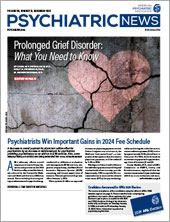APA’s Board of Trustees approved a new position statement on the regulatory oversight of mental health data, smart phone applications, and novel technologies during the virtual meeting of the Board in October.
•
The newly approved statement asserts the following:
•
Data privacy and patient protection frameworks need to be updated frequently to protect patients’ online mental health data.
•
Data privacy standards should apply to any platform that hosts sensitive health-related data, particularly data related to mental illness and substance use. If the standards of the Health Information Protection and Accountability Act (HIPAA) are not met, a clear statement must be made—in plain, brief, and prominent language actively accepted by the user—that the patient does not have an expectation of privacy while using the app.
•
Treatment-focused apps must adopt high standards of evidence-based practice and can function as a supplement to mental health care but are not a substitute for care delivered by a licensed mental health clinician for clinically significant mental illness.
The position statement notes that the technology market has increasingly become host to large amounts of data about the public’s mental health. Yet, many internet-based companies, both those with primary business in health and those that provide broader technology services but may host or receive health care data (for instance, through targeted advertising arrangements), are not subject to regulations—by HIPAA or the Food and Drug Administration (
Digital Mental Health Apps Need More Regulatory Oversight). Additionally, consumer technology companies have been found to sell aggregate and individually identifiable mental health data.
“Consumer-facing, treatment-focused apps are becoming an increasingly common modality of accessing mental health services,” according to the statement. “They offer pathways to improve health outcomes through convenient, patient-driven access to mental health support and self-management tools. However, these technologies may—like other media channels—expose patients to non-evidence-based, unregulated approaches, while the sharing of sensitive health-related user data by technology companies could expose users to unintended harm. Oversight and accountability of data commoditization and treatment-focused apps are necessary to maintain patient safety, trust, and privacy.”
The statement was written by members of the APA Committee on Mental Health IT, APA Committee on Telepsychiatry, and APA Council on Quality Care.
Support for Transgender Case
Trustees also voted to approve APA’s signing on to an amicus brief in the case
Doe v. Horne. The suit was filed by the National Center for Lesbian Rights on behalf of two transgender girls barred from playing sports by an Arizona state law that prohibits transgender girls from competing in girls’ sports.
Co-signers to the amicus brief include the AMA, the Arizona chapter of the American Academy of Pediatrics, the Arizona Medical Association, the American Medical Women’s Association, GLMA: Health Professionals Advancing LGBTQ+ Equality, and the World Professional Association for Transgender Health.
“For transgender girls and women forced by the State to play on a boys’ sports team, the statute frustrates the treatment of gender dysphoria by preventing these student athletes from living openly in accordance with their gender identity,” the amicus states. “For transgender girls who refuse to compromise their medical treatment by playing on a boys’ sports team as mandated by the statute, Arizona denies them the numerous health and developmental benefits of participation in sports activities. For all transgender students, the statute also reinforces the stigma associated with being transgender.”
The amicus states that over 1.6 million adults and youth in the United States identify as transgender, which is roughly 0.6% of Americans aged thirteen years or older. In Arizona, around 1.54% or 7,300 youth between the ages of thirteen and seventeen identify as transgender.
Payment News
As part of his report, APA CEO and Medical Director Saul Levin, M.D., M.P.A., drew attention to some good news in the area of federal advocacy. He noted that in July, the departments of Labor, Treasury, and Health and Human Services released a proposed rule intended to strengthen the enforcement of the 2008 Mental Health Parity and Addiction Equity Act (MHPAEA) (
Federal Agency Declares It Is ‘Dead Set’ on Enforcing Parity).
“The proposed rule is a big win for the mental health and substance use community because they finally close many of the loopholes in MHPAEA that insurance companies routinely use to deny care for mental health conditions and substance use disorders,” Levin said.
He also drew attention to good news in the
2024 Medicare Physician Fee Schedule, which was in the form of a proposed rule at the time of the Board meeting. The final rule was released by the Centers for Medicare and Medicaid Services in early November and included important advocacy victories in the areas of physician reimbursement, outpatient telepsychiatry, MIPS (Merit-Based Incentive Payment System) reporting, and virtual supervision of trainees. The new policies will go into effect January 1, 2024 (
Psychiatrists Win Important Gains in 2024 Fee Schedule).
Other Actions
The Board approved Adrian Preda, M.D., as medical editor in chief of
Psychiatric News effective January 1, 2024, for a three-year term (
Preda Appointed Medical Editor in Chief of Psychiatric News). Also approved were the appointments of three psychiatrists to the editorial board of
The American Journal of Psychotherapy for four-year terms beginning January 1, 2024, and expiring on December 31, 2027: Katherine G. Kennedy, M.D., Anne E. Ruble, M.D., M.P.H., and Randon S. Welton, M.D. ■
